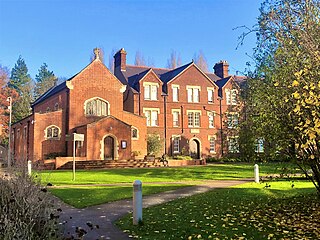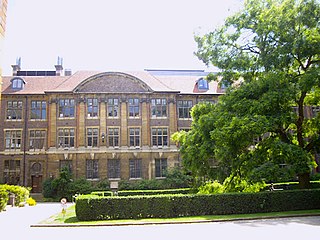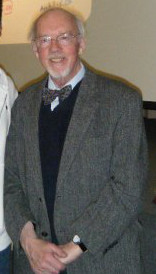Related Research Articles

The University of Cambridge is composed of 31 colleges in addition to the academic departments and administration of the central University. Until the mid-19th century, both Cambridge and Oxford comprised a group of colleges with a small central university administration, rather than universities in the common sense. Cambridge's colleges are communities of students, academics and staff – an environment in which generations and academic disciplines are able to mix, with both students and fellows experiencing "the breadth and excellence of a top University at an intimate level".

St Edmund's College is a constituent college of the University of Cambridge in England. Founded in 1896, it is the second-oldest of the four Cambridge colleges oriented to mature students, which accept only students reading for postgraduate degrees or for undergraduate degrees if aged 21 years or older.

The Department of Plant Sciences is a department of the University of Cambridge that conducts research and teaching in plant sciences. It was established in 1904, although the university has had a professor of botany since 1724.

Sir Hans Leo Kornberg, FRS was a British-American biochemist. He was Sir William Dunn Professor of Biochemistry in the University of Cambridge from 1975 to 1995, and Master of Christ's College, Cambridge from 1982 to 1995.

The MRC Mitochondrial Biology Unit is a department of the School of Clinical Medicine at the University of Cambridge, funded through a strategic partnership between the Medical Research Council and the University. It is located at the Addenbrooke’s Hospital / Cambridge Biomedical Campus site in Cambridge, England. The unit is concerned with the study of the mitochondrion, as this organelle has a varied and critical role in many aspects of eukaryotic metabolism and is implicated in many metabolic, degenerative, and age-related human diseases.
Colin H. Williams was research professor in sociolinguistics, now an honorary professor, in the School of Welsh, Cardiff University. Currently he is a Senior Research Associate at the VHI, l St Edmund's College, the University of Cambridge, UK.

Simon Mitton is an astronomer and writer. He is based at St Edmund's College, Cambridge. He has written numerous astronomical works. The most well known of these is his biography of fellow Cambridge astronomer Fred Hoyle.
Derek Clissold Burke was a British academic who served as Vice-Chancellor of the University of East Anglia from 1987-1995.
Peter Henry St George-Hyslop, OC, FRS, FRSC, FRCPC, is a British and Canadian medical scientist, neurologist and molecular geneticist who is known for his research into neurodegenerative diseases. St George-Hyslop is one of the most cited authors in the field of Alzheimer's disease research. He has identified a number of key genes that are responsible for nerve cell degeneration and early-onset forms of Alzheimer's disease. These include the discovery of the presenilins, Nicastrin, and SORL1 genes. Presenilin mutations are the most common cause of familiar Alzheimer's disease. St George-Hyslop also co-led the discovery of the gene for the amyloid precursor protein.
John Andrew Todd FMedSci FRS is Professor of Precision Medicine at the University of Oxford, director of the Wellcome Center for Human Genetics and the JDRF/Wellcome Trust Diabetes and Inflammation Laboratory, in addition to Jeffrey Cheah Fellow in Medicine at Brasenose College. He works in collaboration with David Clayton and Linda Wicker to examine the molecular basis of type 1 diabetes.
William Anthony Harris FRS FMedSci is a Canadian-born neuroscientist, Professor of Anatomy at Cambridge University, and fellow of Clare College, Cambridge. He was head of the Department of Physiology, Development and Neuroscience since its formation in 2006 until his retirement in 2018.
Mary Christine Carpenter is an English historian who serves as professor of medieval English history at the University of Cambridge.
David Chaim Rubinsztein FRS FMedSci is the Deputy Director of the Cambridge Institute of Medical Research (CIMR), Professor of Molecular Neurogenetics at the University of Cambridge and a UK Dementia Research Institute Professor.
Christopher L.-H. Huang FRSB is professor of cell physiology at the University of Cambridge.

Dame Theresa Mary Marteau, is a British health psychologist, professor, and director of the Behaviour and Health Research Unit at the University of Cambridge, Fellow and director of studies for Psychological and Behavioural Sciences at Christ's College, Cambridge.
Sharon Jayne Peacock is a British microbiologist who is Professor of Public Health and Microbiology in the Department of Medicine at the University of Cambridge. She is known for her work on the use of microbial whole genome sequencing in diagnostic and public health microbiology, particularly on the bacterium Burkholderia pseudomallei and on methicillin-resistant Staphylococcus aureus (MRSA).
Judy Hirst is a British scientist specialising in mitochondrial biology. She is Director of the MRC Mitochondrial Biology Unit at the University of Cambridge.
Emily Joanna Gowers, is a British classical scholar. She is Professor of Latin Literature at the University of Cambridge and a Fellow of St John's College, Cambridge. She is an expert on Horace, Augustan literature, and the history of food in the Roman world.
Charles Nicholas "Nick" Hales (1935–2005) was an English physician, biochemist, diabetologist, pathologist, and professor of clinical biochemistry
Franklin Imo Aigbirhio, is a Nigerian-born British chemist and academic specialising in biomedical imaging research. Since 2014 he has been the Professor of Molecular Imaging Chemistry at the University of Cambridge.
References
- 1 2 LUZIO, Prof. (John) Paul, Who's Who 2014, A & C Black, 2014; online edn, Oxford University Press, 2014
- ↑ "St Edmund's College - University of Cambridge". www.st-edmunds.cam.ac.uk. Retrieved 10 September 2018.